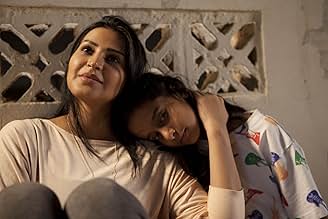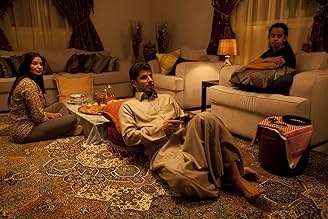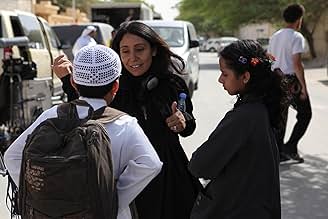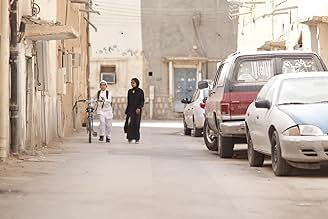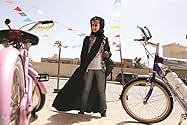CALIFICACIÓN DE IMDb
7.5/10
22 k
TU CALIFICACIÓN
Una niña saudita emprendedora se inscribe en la competencia de recitación del Corán de su escuela como una forma de recaudar los fondos faltantes que necesita para comprar la bicicleta verde... Leer todoUna niña saudita emprendedora se inscribe en la competencia de recitación del Corán de su escuela como una forma de recaudar los fondos faltantes que necesita para comprar la bicicleta verde que ha captado su interés.Una niña saudita emprendedora se inscribe en la competencia de recitación del Corán de su escuela como una forma de recaudar los fondos faltantes que necesita para comprar la bicicleta verde que ha captado su interés.
- Dirección
- Guionista
- Elenco
- Nominada a1 premio BAFTA
- 22 premios ganados y 36 nominaciones en total
Abdullrahman Al Gohani
- Abdullah
- (as Abdullrahman Algohani)
Sara Al Jaber
- Leila
- (as Sara Aljaber)
- Dirección
- Guionista
- Todo el elenco y el equipo
- Producción, taquilla y más en IMDbPro
Opiniones destacadas
One thing that makes this movie stands out is the fact that it is entirely based in Saudi Arabia.
Regardless what one thinks of that country, be that knowledge or just stereotyping, it has a culture that is very different than that of what the western audience is accustomed to.
So he have a heroine who is your typical rebel teenage girl, who has realised that being a woman can be challenging and she therefore must give her fight to survive. The story revolves around an utterly sinful desire this young revolver has: to buy and ride a bicycle. To go about that, she must overcome her mum's objections, the shopkeeper's and pretty much everyone she is acquainted with.
Unprepared to simply accept fate, she is prepared to do whatever it takes to ride that bicycle. Quirky and witty, this is a delight and one should not allow any preconceived notions of Arabic culture to stand in the way of enjoying this pleasurable debut.
Wadjda is a hero in any culture.
Regardless what one thinks of that country, be that knowledge or just stereotyping, it has a culture that is very different than that of what the western audience is accustomed to.
So he have a heroine who is your typical rebel teenage girl, who has realised that being a woman can be challenging and she therefore must give her fight to survive. The story revolves around an utterly sinful desire this young revolver has: to buy and ride a bicycle. To go about that, she must overcome her mum's objections, the shopkeeper's and pretty much everyone she is acquainted with.
Unprepared to simply accept fate, she is prepared to do whatever it takes to ride that bicycle. Quirky and witty, this is a delight and one should not allow any preconceived notions of Arabic culture to stand in the way of enjoying this pleasurable debut.
Wadjda is a hero in any culture.
It is quite hard to come to Wadjda with a clear head and I suspect with the awards season coming up, it will be harder to do so in the future, which is why I wanted to watch it now. Part of the reason for this is that the film has had quite a bit of publicity due to its place in history, it being the first film in Saudi Arabia directed by a woman and this made me think that perhaps critics would have been quick to be generous to it. For sure I think this is a factor and the context of it representing (in theory) a country moving towards ever so slightly less hard-line conservatism may also be a factor in awards voting; but my concern was that this mean weaknesses were forgiven and stronger aspects were hyped up. The second thing in my mind was that perhaps Wadja would be very critical of Saudi as it may be seen as "time to settle some scores" and that this would be less a film and more a finger wagging exercise.
The reality is that neither of these are really the case and indeed the main strength of Wadjda is that it is simply a coming-of-age story which is set in Saudi Arabia. This means that the film doesn't push an agenda in a very heavy handed and frequent way, but rather just uses the culture of its setting as part of its story, just like any other such film would do in the context of their country. I liked this a lot because very quickly I was able to settle in and just enjoy the film for its character and story. And it helps that the story is engaging, warm and quite cheering in some ways; Wadjda is a sweet heart to the film and is very well played indeed by Waad Mohammed and she plays very well with her simple goal of just wanting to be herself and not be restricted by others – again a theme that maybe has more significant in her context, but still one common to these types of films. The film plays his out well with other threads and challenges to others around her which resonate with the impact of restrictions but again not in a heavy-handed or really obvious way.
It is a fine line to walk but the film does manage to flag issues for discussion but not to do so in a way that is overly critical or unrealistic even if it is progressive; perhaps to use the right language it is a very subdued and modest criticism and it is never front and centre on the screen. The balance means that it will engage you with the simple structure of its story while also making its points with things shown to inform and characters within the story used to illustrate different aspects of choices to be made – whether it be Wadjda's refusal to be restrained or Ms Hussa's overcompensation for not doing the same herself. It is very well shot and directed – and not "considering the circumstances", but rather it just is. The use of locations is really good, giving the film a strong sense of play and I do hope someday there is a "making of" documentary as I think the daily reality of making this must itself be an interesting story.
Wadjda is a very good film even if I think a lot of the hype and gushing that will come during the awards season is as much about the context as it is about the film itself – although this is not a bad thing by any means. The makers walk a fine line really well – not making direct criticisms so much as telling an engaging and warm story out of which comes the obvious criticisms and discussions which could be had. It does this very well and deserves to be seen as a film as well as a statement.
The reality is that neither of these are really the case and indeed the main strength of Wadjda is that it is simply a coming-of-age story which is set in Saudi Arabia. This means that the film doesn't push an agenda in a very heavy handed and frequent way, but rather just uses the culture of its setting as part of its story, just like any other such film would do in the context of their country. I liked this a lot because very quickly I was able to settle in and just enjoy the film for its character and story. And it helps that the story is engaging, warm and quite cheering in some ways; Wadjda is a sweet heart to the film and is very well played indeed by Waad Mohammed and she plays very well with her simple goal of just wanting to be herself and not be restricted by others – again a theme that maybe has more significant in her context, but still one common to these types of films. The film plays his out well with other threads and challenges to others around her which resonate with the impact of restrictions but again not in a heavy-handed or really obvious way.
It is a fine line to walk but the film does manage to flag issues for discussion but not to do so in a way that is overly critical or unrealistic even if it is progressive; perhaps to use the right language it is a very subdued and modest criticism and it is never front and centre on the screen. The balance means that it will engage you with the simple structure of its story while also making its points with things shown to inform and characters within the story used to illustrate different aspects of choices to be made – whether it be Wadjda's refusal to be restrained or Ms Hussa's overcompensation for not doing the same herself. It is very well shot and directed – and not "considering the circumstances", but rather it just is. The use of locations is really good, giving the film a strong sense of play and I do hope someday there is a "making of" documentary as I think the daily reality of making this must itself be an interesting story.
Wadjda is a very good film even if I think a lot of the hype and gushing that will come during the awards season is as much about the context as it is about the film itself – although this is not a bad thing by any means. The makers walk a fine line really well – not making direct criticisms so much as telling an engaging and warm story out of which comes the obvious criticisms and discussions which could be had. It does this very well and deserves to be seen as a film as well as a statement.
We went to see this as a family, with our two daughters, 14 and 16. We all enjoyed it. Seeing how the limitations placed on women in Saudi Arabia play out in everyday life was of great interest to all of us. The story line depicted not only Wadjda's efforts to break free from her circumscribed world, but also how adult women struggle to survive. The effort to simply support oneself without a man when one can't even drive or wear clothes that allow for mobility reflects how rules ostensibly meant to "protect" women keep them dependent on men for the most rudimentary basics.
I suspect that even this film does not depict the lives of women in Saudi Arabia completely accurately. Some concessions seem to have been made to the government. No religious police are to be seen, for example. Nonetheless, it is well worth seeing, and we applaud Haifaa al-Mansour for making it. We look forward to her future work.
I suspect that even this film does not depict the lives of women in Saudi Arabia completely accurately. Some concessions seem to have been made to the government. No religious police are to be seen, for example. Nonetheless, it is well worth seeing, and we applaud Haifaa al-Mansour for making it. We look forward to her future work.
¨You won't be able to have children if you ride a bike.¨
Wadjda is a beautiful yet simple film about a young girl who is willing to break society's boundaries and traditions in order to achieve her goal. In a sense it plays out as a metaphor considering Wadjda is the first feature film from Saudi Arabia which happens to be directed by a female. In a culture where women aren't allowed to speak up to men or even to drive a vehicle, Haifaa Al-Mansour has found a way to share her voice with the world through cinema. That is groundbreaking on its own considering that Saudi Arabia doesn't even have a film industry and that women are very much tied up to the limitations that their society puts on them. Al- Mansour, who also wrote the screenplay, gets her message across in a simple manner without trying to be judgmental or harsh on her culture. It is through the eyes of this 10 year old girl that we see how difficult the culture is on women. Not being allowed to ride a bike for fear that she could lose her virtue and purity plays out as a metaphor as to the limitations females face in these countries. I'm pretty sure that we all agree with Al-Mansour's viewpoints here in the west, but it is a shame that this film won't be seen by the people who really should see this film, the Saudis. It may be a familiar tale to us (it has all the known elements of a classic underdog story), but it works thanks to a wonderful performance from the young Waad Mohammed who plays a character we all can identify and relate to. Wadjda is worth seeing for the historical significance it has for females in Islamic countries who are trying to get their voice heard.
Wadjda (Waad Mohammed) is a ten year old girl from Saudi Arabia who lives with her mother (Reem Abdullah) in Riyadh. She's from a very conservative society where women have to cover their hair around men, but she is a very lovable girl who's always pushing the boundaries to her limitations. When one of the boys (Abdullrahman Al Gohani) begins teasing her and outruns her on his bike, she promises that she will buy one to race him and beat him. She sees a beautiful green bike on sale and since her mother doesn't give her the money because she considers girls shouldn't ride bikes, Wadjda decides to raise the money herself. The perfect opportunity presents itself when director Ms. Hussa (Ahd) offers prize money for the winner of a Koran recitation competition at her school. Wadjda begins to dedicate her time and efforts to this competition, while her mother is worried about trying to convince her husband (Sultan Al Assaf) to stay with her and not get remarried. Wadjda is dedicated to achieving her goal despite the limitations presented by the people around her.
The young and talented Waad Mohammed stands out in this film with a heartfelt and lovable performance. It is a simple tale and one we've seen many times in the past with the exception that this film is told by someone who has been facing those very same limitations. Some universal themes about the human spirit and the power of the will are portrayed nicely in this film through the eyes and smile of Waad Mohammaed. Director, Al-Mansour, also gives us glimpses of the limitations women have to face through very small scenes and moments. There is a scene where Wadjda's mother is shopping for a dress and she tries on a beautiful red one and you can't help but wonder what a waste it is considering she can only wear it at home for her husband. She covers herself completely when there is a man around. She also spends so much time fixing her hair, only to cover it until her husband who sometimes doesn't show up in days can appreciate it. Al-Mansour presents these scenes without being judgmental, but they come through very well. Wadjda, like us, doesn't seem to understand all this and won't conform to those boundaries, which is the director's way of sharing her hope for a brighter future for these women. Maybe if there were more determined girls like Wadjda they could break through some of those boundaries and limitations and have some more freedom. The film is full of hope like the main character and it is one worth seeing.
Wadjda is a beautiful yet simple film about a young girl who is willing to break society's boundaries and traditions in order to achieve her goal. In a sense it plays out as a metaphor considering Wadjda is the first feature film from Saudi Arabia which happens to be directed by a female. In a culture where women aren't allowed to speak up to men or even to drive a vehicle, Haifaa Al-Mansour has found a way to share her voice with the world through cinema. That is groundbreaking on its own considering that Saudi Arabia doesn't even have a film industry and that women are very much tied up to the limitations that their society puts on them. Al- Mansour, who also wrote the screenplay, gets her message across in a simple manner without trying to be judgmental or harsh on her culture. It is through the eyes of this 10 year old girl that we see how difficult the culture is on women. Not being allowed to ride a bike for fear that she could lose her virtue and purity plays out as a metaphor as to the limitations females face in these countries. I'm pretty sure that we all agree with Al-Mansour's viewpoints here in the west, but it is a shame that this film won't be seen by the people who really should see this film, the Saudis. It may be a familiar tale to us (it has all the known elements of a classic underdog story), but it works thanks to a wonderful performance from the young Waad Mohammed who plays a character we all can identify and relate to. Wadjda is worth seeing for the historical significance it has for females in Islamic countries who are trying to get their voice heard.
Wadjda (Waad Mohammed) is a ten year old girl from Saudi Arabia who lives with her mother (Reem Abdullah) in Riyadh. She's from a very conservative society where women have to cover their hair around men, but she is a very lovable girl who's always pushing the boundaries to her limitations. When one of the boys (Abdullrahman Al Gohani) begins teasing her and outruns her on his bike, she promises that she will buy one to race him and beat him. She sees a beautiful green bike on sale and since her mother doesn't give her the money because she considers girls shouldn't ride bikes, Wadjda decides to raise the money herself. The perfect opportunity presents itself when director Ms. Hussa (Ahd) offers prize money for the winner of a Koran recitation competition at her school. Wadjda begins to dedicate her time and efforts to this competition, while her mother is worried about trying to convince her husband (Sultan Al Assaf) to stay with her and not get remarried. Wadjda is dedicated to achieving her goal despite the limitations presented by the people around her.
The young and talented Waad Mohammed stands out in this film with a heartfelt and lovable performance. It is a simple tale and one we've seen many times in the past with the exception that this film is told by someone who has been facing those very same limitations. Some universal themes about the human spirit and the power of the will are portrayed nicely in this film through the eyes and smile of Waad Mohammaed. Director, Al-Mansour, also gives us glimpses of the limitations women have to face through very small scenes and moments. There is a scene where Wadjda's mother is shopping for a dress and she tries on a beautiful red one and you can't help but wonder what a waste it is considering she can only wear it at home for her husband. She covers herself completely when there is a man around. She also spends so much time fixing her hair, only to cover it until her husband who sometimes doesn't show up in days can appreciate it. Al-Mansour presents these scenes without being judgmental, but they come through very well. Wadjda, like us, doesn't seem to understand all this and won't conform to those boundaries, which is the director's way of sharing her hope for a brighter future for these women. Maybe if there were more determined girls like Wadjda they could break through some of those boundaries and limitations and have some more freedom. The film is full of hope like the main character and it is one worth seeing.
A poignantly triumphant movie, the storyline of "WADJDA" is just as phenomenal as the story of how the film came to be. In short, "WADJDA" represents quite a number of firsts. It's the first feature film shot entirely in Saudi Arabia, a country where cinema is prohibited. Writer and director Haifaa Al Mansour is Saudi Arabia's first female filmmaker. It is also the first submission from Saudi Arabia for the Foreign Language Category for the 2014 Academy Awards.
Set in a country known for its repression of women, the movie follows our title character—a 10-year-old spirited girl—in her journey to buy a new bicycle so she can race her best friend, neighbor and crush Abdullah. Even though Wadjda's mother warns her to stay away from both bikes and boys because of their culture's strict customs, Wadjda is determined to buy her bike with her own hard-earned money, no matter what the consequences. This, in turn, leads to joining a Koran competition at school. If she wins, she will have more than enough to buy a bike and therefore beat the boy next door.
Subtly, the film explores the repercussions from this society in which girls should only be seen, not heard and, in public, only their eyes should be seen, with the rest of their faces covered by black veils. Wadjda tests boundaries in her search for freedom of expression. Although she discovers the contradictions in her world, she's determined to challenge women's traditional roles. The movie covers major topics such as polygamy and child-brides, as well as smaller oppressions such as the restriction of driving and rules of women in the presence of men.
It's mind-blowing to me that a movie about the oppression of women was made in the exact environment it depicts. On DVD, the making-of featurette explores in-depth the struggles and challenges that faced director Haifaa Al Mansour. The line, "respectable girls go inside," is said to Wadjda in the film, and Mansour confronted the same problems. She had to direct her cast out-of-sight using a walkie-talkie to communicate with her cast and a monitor to watch the filming. She could not be seen working with men and often, when religious officials would come to inspect the bustle, production would be halted and moved to another location. It took close to five years to make the movie, but the effort is worth it.
First timer Waad Mohammed is perfect as the fun-loving rebel Wadjda. This film is rated PG and I recommend it for ages 10 to 18. The pace may be slow for kids under ten. This is truly a landmark film that the world needs to watch. I give it five out of five stars. Perhaps the most uplifting message is that although the plot is fiction, the remarkable story behind the movie is not, and that shows that revolution is possible. This film played in theaters last year and will be released on February 11 on DVD/Blu-ray.
Reviewed by KIDS FIRST Film Critic Cassandra H. For more youth reviews go to kidsfirst dot org.
Set in a country known for its repression of women, the movie follows our title character—a 10-year-old spirited girl—in her journey to buy a new bicycle so she can race her best friend, neighbor and crush Abdullah. Even though Wadjda's mother warns her to stay away from both bikes and boys because of their culture's strict customs, Wadjda is determined to buy her bike with her own hard-earned money, no matter what the consequences. This, in turn, leads to joining a Koran competition at school. If she wins, she will have more than enough to buy a bike and therefore beat the boy next door.
Subtly, the film explores the repercussions from this society in which girls should only be seen, not heard and, in public, only their eyes should be seen, with the rest of their faces covered by black veils. Wadjda tests boundaries in her search for freedom of expression. Although she discovers the contradictions in her world, she's determined to challenge women's traditional roles. The movie covers major topics such as polygamy and child-brides, as well as smaller oppressions such as the restriction of driving and rules of women in the presence of men.
It's mind-blowing to me that a movie about the oppression of women was made in the exact environment it depicts. On DVD, the making-of featurette explores in-depth the struggles and challenges that faced director Haifaa Al Mansour. The line, "respectable girls go inside," is said to Wadjda in the film, and Mansour confronted the same problems. She had to direct her cast out-of-sight using a walkie-talkie to communicate with her cast and a monitor to watch the filming. She could not be seen working with men and often, when religious officials would come to inspect the bustle, production would be halted and moved to another location. It took close to five years to make the movie, but the effort is worth it.
First timer Waad Mohammed is perfect as the fun-loving rebel Wadjda. This film is rated PG and I recommend it for ages 10 to 18. The pace may be slow for kids under ten. This is truly a landmark film that the world needs to watch. I give it five out of five stars. Perhaps the most uplifting message is that although the plot is fiction, the remarkable story behind the movie is not, and that shows that revolution is possible. This film played in theaters last year and will be released on February 11 on DVD/Blu-ray.
Reviewed by KIDS FIRST Film Critic Cassandra H. For more youth reviews go to kidsfirst dot org.
¿Sabías que…?
- TriviaBecause of restrictions placed on women in Saudi Arabia, director Haifaa Al-Mansour was not allowed to interact with her mostly male crew. She had to direct the street scenes from a nearby van, watching through a monitor and giving instructions via walkie-talkie.
- ErroresWhen Wadjda takes the bread out of the oven, mic equipment is visible on her waist, under her T-shirt.
- ConexionesFeatured in At the Movies: Venice Film Festival 2012 (2012)
- Bandas sonorasDead Island
© Copyright 2012 and Published by Deep Silver, a division of Koch Media
Gmbh, Gewerbegebiet 1, 6604 Hofen, Austria.
Developed 2011, Techland Sp, z.o.o., Poland,
© Copyright 2012, Chrome Engine, Techland Sp. z.o.o.
Selecciones populares
Inicia sesión para calificar y agrega a la lista de videos para obtener recomendaciones personalizadas
Detalles
Taquilla
- Total en EE. UU. y Canadá
- USD 1,347,747
- Fin de semana de estreno en EE. UU. y Canadá
- USD 41,253
- 15 sep 2013
- Total a nivel mundial
- USD 6,499,169
- Tiempo de ejecución
- 1h 38min(98 min)
- Color
- Mezcla de sonido
- Relación de aspecto
- 1.85 : 1
Contribuir a esta página
Sugiere una edición o agrega el contenido que falta







